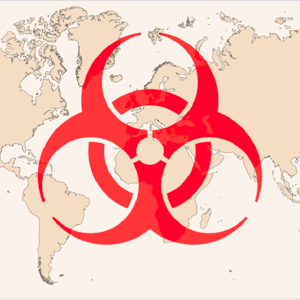Epidemics - the Dynamics of Infectious Diseases
Not so long ago, it was almost guaranteed that you would die of an infectious disease. In fact, had you been born just 150 years ago, your chances of dying of an infectious disease before you’ve reached the tender age of 5 would have been extremely high. Since then, science has come a long way in understanding infectious diseases - what they are, how they spread, and how they can be prevented. But diseases like HIV/AIDS, Malaria, Tuberculosis, or the flu are still major killers worldwide, and novel emerging diseases are a constant threat to public health. In addition, the bugs are evolving. Antibiotics, our most potent weapon against bacterial infections, are losing their power because the bacteria are becoming resistant. In this course, we’ll explore the major themes of infectious diseases dynamics.
After we’ve covered the basics, we’ll be looking at the dynamics of the flu, and why we’re worried about flu pandemics. We’ll be looking at the dynamics of childhood diseases such as measles and whooping cough, which were once considered almost eradicated, but are now making a comeback. We’ll explore Malaria, and use it as a case study of the evolution of drug resistance. We’ll even be looking at social networks - how diseases can spread from you to your friends to your friends’ friends, and so on. And of course we’ll be talking about vaccination too. We’ll also be talking about how mobile phones, social media and crowdsourcing are revolutionizing disease surveillance, giving rise to a new field of digital epidemiology. And yes, we will be talking about Zombies - not human zombies, but zombie ants whose brains are hijacked by an infectious fungus.
We’re looking forward to having you join us for an exciting course!
None
Syllabus
Syllabus - What you will learn from this course
Week 1
Course Introduction
Pathogens
Week 2
Hosts
Week 3
Basics of Ecology
Week 4
Epidemiology
Week 5
Vaccination
Week 6
Control Mechanisms
Week 7
Emergence
Week 8
Global Health
Ask Us Anything Videos
FAQ
When will I have access to the lectures and assignments?
Access to lectures and assignments depends on your type of enrollment. If you take a course in audit mode, you will be able to see most course materials for free. To access graded assignments and to earn a Certificate, you will need to purchase the Certificate experience, during or after your audit. If you don't see the audit option:
The course may not offer an audit option. You can try a Free Trial instead, or apply for Financial Aid.
The course may offer 'Full Course, No Certificate' instead. This option lets you see all course materials, submit required assessments, and get a final grade. This also means that you will not be able to purchase a Certificate experience.
What will I get if I purchase the Certificate?
When you purchase a Certificate you get access to all course materials, including graded assignments. Upon completing the course, your electronic Certificate will be added to your Accomplishments page - from there, you can print your Certificate or add it to your LinkedIn profile. If you only want to read and view the course content, you can audit the course for free.
Is financial aid available?
Yes. In select learning programs, you can apply for financial aid or a scholarship if you can’t afford the enrollment fee. If fin aid or scholarship is available for your learning program selection, you’ll find a link to apply on the description page.
Reviews
The course was interesting and very well structured. I thank the Coursera team and as well as the instructors for their sharing their valuable time and knowledge.
It is great!. I have been learned about experiments that researchers have been developed to understand the interaction between the host and the infectious agent.
The instructors were very good and many of there examples were very interesting. Of particular interest to me, was the story of the Irish potato famine and the the zombie ants.
I thoroughly enjoyed this course and learned a great deal of information in the process. I found the interviews to be very helpful in bringing it all together for me. Thank you professors!
